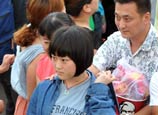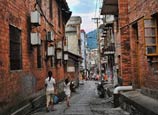
 |
| Lin Yifu, Chinese senior economist. (File Photo) |
Justin Yifu Lin, honorary dean of the National School of Development with Peking University and former chief economist with the World Bank, discussed at the China's Opportunities and Challenges academic forum, hosted by the Boyuan Foundation, his views on the ongoing liquidity crisis in Chinese banks, China's economic growth and capital control.
The Wall Street Journal reports that Chinese banks have asked the nation's central bank [the People's Bank of China, ed.] to offer more liquidity relief to save the market. Do you think it's necessary for the central bank to do so?
Lin: I did not see or hear any commercial banks pressuring the central bank to increase liquidity provision. I guess these reports are [mainly] assumptions. As for the position of the head of the central bank, it is his responsibility to maintain the stability of China's macro-economy, its financial system and its order. If the current liquidity shortage proves harmful to the nation's stability, under the circumstances, it is the central bank's responsibility to increase the supply of money.
Recent statistics show that China's economic growth has slowed down. Some people think that this is related to the 2008 4-trillion-stimulus-plan. What's your opinion on this?
Lin: In my opinion, the momentum of Chinese economic growth comes from a troika consisting of trade, investment and consumption. As far as consumption goes, its growth reached 9 percent annually up to last year. Nevertheless, the other two have slowed down in terms of growth speed. Trade has been affected by the slowdown of consumption growth in developed economies which have suffered a severe blow from the global financial crisis that broke out in 2008. For example, last year's export growth was only 7.6 percent, an almost 10 percent drop from the average annual growth rate of 17 percent sustained since 1979.
As for investment, we had a 4 trillion stimulus package in 2008. Most are large-scale investment projects. Nonetheless, investment growth has been very slow compared with that of the other two. For that reason, the troika has been running slower than before. It is simply a periodic problem in the overall economic growth.
Do you mean that the economy will regain a high speed growth in the future?
Lin: I would rather say that it has the potential to do so. Whether it can regain a high speed or not depends on the correct and suitable policies, and a favorable environment for investment and consumption. We need to further our reform.
You have mentioned many times before that the Chinese economy has the potential to retain an 8 percent annual growth for 20 years. This potential stems from two aspects, namely comparative advantage and deepening reform. In what fields do you think that China needs to further its reform?
Lin: China indeed, as you mentioned, has a great late-mover's advantage. Yet tapping into the potential at a fast growth rate needs a harmonious society and continuous reforms.
Addressing the income gap, which has gradually widened, is a priority. The dual-track price system implemented at the beginning of the reform, helped to maintain a stable and rapid development, but sacrificed equal income distribution. At present, the over-concentration of finances in big banks, stock markets, telecommunications and transportation, has caused revenues and wealth to be redistributed to the rich people and big companies. This situation will cause depression and dissatisfaction among the public.
There is some distortion of governance in the economic transition that blocks our government's ability to guide the industrial technical upgrade in a market economy or to deal with the issues of environment protection or food safety. We need to remove this distortion through reform and enable the government do a good job.

















 In pictures: history of China's auto industry
In pictures: history of China's auto industry


![]()
